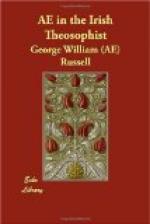Then another voice from below laughed at the madness. Full of scorn it spake, “You, born of clay, a ruler of stars? Pitiful toiler with the pen, feeble and weary body, what shall make of you a spirit?” Harvey thrust away this hateful voice. From his soul came the impulse to go to other lands, to wander for ever and ever under the star-rich skies, to be a watcher of the dawn and eve, to live in forest places or on sun-nurtured plains, to merge himself once more in the fiery soul hidden within. But the mocking voice would not be stifled, showing him how absurd and ridiculous it was “to become a vagabond,” so the voice said, and finally to die in the workhouse. So the eternal spirit in him, God’s essence, conscious of its past brotherhood, with the morning stars, the White Aeons, in its prisonhouse writhed with the meanness, till at last he cried, “I will struggle no longer; it is only agony of spirit to aspire here at all; I will sit and wait till the deep darkness has vanished.”
But the instruction was not yet complete; he had learned the primal place of spirit; he had yet to learn its nature. He began to think with strange sadness over the hopes of the world, the young children. He saw them in his vision grow up, bear the burden in silence or ignorance; he saw how they joined in dragging onward that huge sphinx which men call civilization; there was no time for loitering amid the beautiful, for if one paused it was but to be trampled by the feet of the many who could not stay or rest, and the wheels of the image ground that soul into nothingness. He felt every pain almost in an anguish of sympathy. Helpless to aid, to his lips came the cry to another which immemorial usage has made intuitive in men. But It is high and calm above all appeal; to It the cries from all the sorrowing stars sound but as one great music; lying in the infinite fields of heaven, from the united feelings of many universes It draws only a vast and passionless knowledge, without distinction of pleasure or pain. From the universal which moves not and aids not, Harvey in his agony turned away. He himself could fly from the struggle; thinking of what far place or state to find peace, he found it true in his own being that nowhere could the soul find rest while there was still pain or misery in the world. He could imagine no place or state where these cries of pain would not reach him: he could imagine no heaven where the sad memory would not haunt him and burn him. He knew then that the nature of the soul was love eternal; he knew that if he fled away a divine compassion would compel him to renew his brotherhood with the stricken and suffering; and what was best forever to do was to fight out the fight in the darkness. There was a long silence in Harvey’s soul; then with almost a solemn joy he grew to realize at last the truth of he himself—the soul. The fight was over; the Gloom and the Glory were linked together, and one inseparably. Harvey was full




